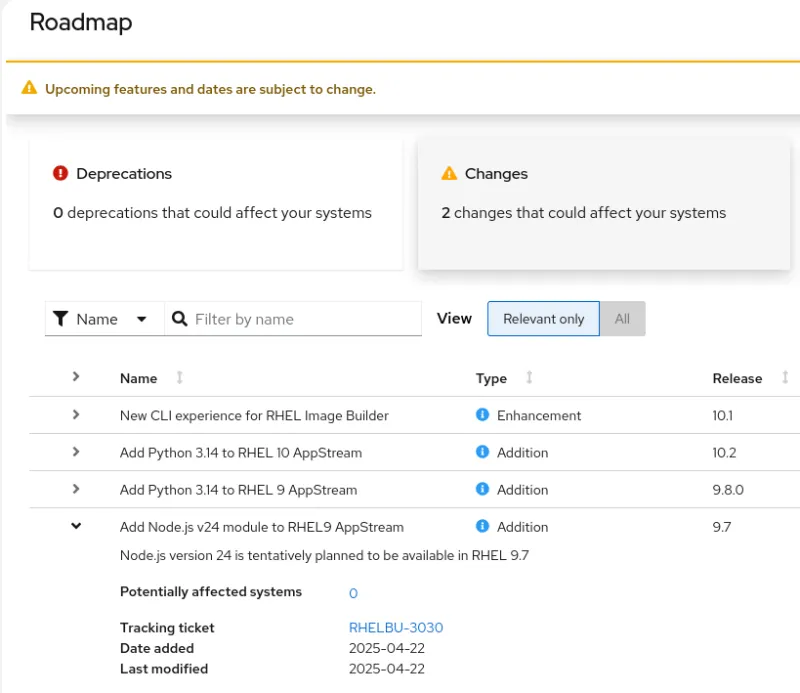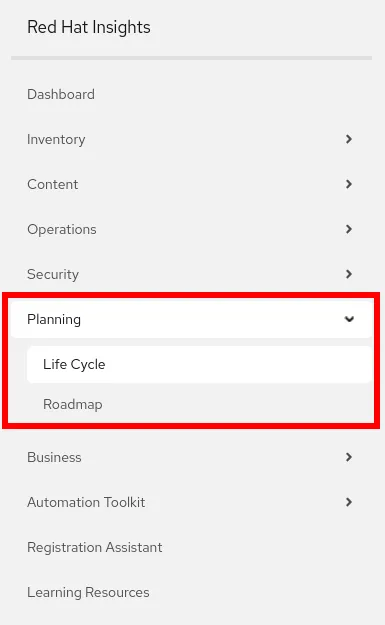Red Hat Insights planning for Red Hat Enterprise Linux (RHEL) is now available, delivering new features designed to assist with planning RHEL upgrades and monitoring the RHEL lifecycle status. Additionally, Insights planning provides visibility into the tentative future roadmap for RHEL.
Insights planning introduces two new features:
- Lifecycle: Provides a centralized lifecycle view for Application Streams and RHEL minor releases, which enables you to plan for upgrades and monitor the status of your environment.
- Roadmap: Provides a view into the tentative roadmap for RHEL, enabling you to better plan ahead, and anticipate the impact of upcoming roadmap items.
Use Insights planning for RHEL lifecycle
Starting with RHEL 8 and above, Application Streams have provided userspace components delivered and updated more frequently than the core operation system packages. Each of these Application stream components has a lifecycle. The lifecycle feature in Insights planning provides information about which versions of RHEL and which versions of RHEL Application Streams you have deployed in your environment.
The Insights planning lifecycle functionality, which supports RHEL 8 and later systems, makes it easy to monitor the status of your environment and plan ahead for RHEL and Application Streams upgrades.
Here's an example of the RHEL 9 Application Stream lifecycle view:

This example shows a RHEL 9 system running Node.js 16, which is an Application Stream that is no longer supported. By utilizing the Insights planning lifecycle feature, you can identify this and start planning an upgrade to bring this system into a supported state. In addition, you can also see that Nginx 1.22 will be going out of support soon, and can proactively plan ahead for an upgrade before support ends.
For more information on the RHEL lifecycle, refer to the Red Hat Enterprise Linux Lifecycle and Red Hat Enterprise Linux Application Streams Lifecycle pages.
Use Insights planning for the RHEL roadmap
Insights planning can also give you a view into the tentative RHEL roadmap.

In this screenshot, you can see the tentative RHEL roadmap with several additions and an enhancement. While the features and dates shown are subject to change, this information can be useful as you plan ahead for upcoming RHEL additions, enhancements, changes and deprecations that might impact your environment. It keeps you informed about potential changes so you can anticipate them and plan ahead.
Next steps
Insights planning is available now on the Insights for RHEL page. Look for the new Planning item in the menu, which contains Lifecycle and Roadmap.

Start utilizing the Insights planning functionality so you can plan ahead for future upgrades, monitor the lifecycle status of your RHEL systems, and view the tentative RHEL roadmap. If you're spending a lot of time sifting through documentation, or trying to memorize lifecycle data, explore the new Insights planning features and discover how it can enhance your RHEL management strategy.
Stay tuned for further updates and advancements to Insights as we continue to deliver tools that help you succeed with Red Hat Enterprise Linux.
Product trial
Red Hat Enterprise Linux | Product trial
About the author
Brian Smith is a product manager at Red Hat focused on RHEL automation and management. He has been at Red Hat since 2018, previously working with public sector customers as a technical account manager (TAM).
More like this
14 software architecture design patterns to know
Getting started with socat, a multipurpose relay tool for Linux
Technically Speaking | Platform engineering for AI agents
Technically Speaking | Driving healthcare discoveries with AI
Browse by channel
Automation
The latest on IT automation for tech, teams, and environments
Artificial intelligence
Updates on the platforms that free customers to run AI workloads anywhere
Open hybrid cloud
Explore how we build a more flexible future with hybrid cloud
Security
The latest on how we reduce risks across environments and technologies
Edge computing
Updates on the platforms that simplify operations at the edge
Infrastructure
The latest on the world’s leading enterprise Linux platform
Applications
Inside our solutions to the toughest application challenges
Virtualization
The future of enterprise virtualization for your workloads on-premise or across clouds
